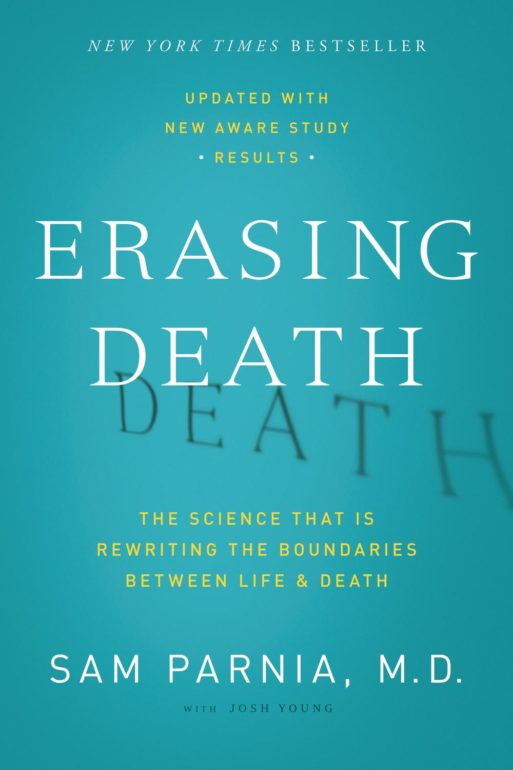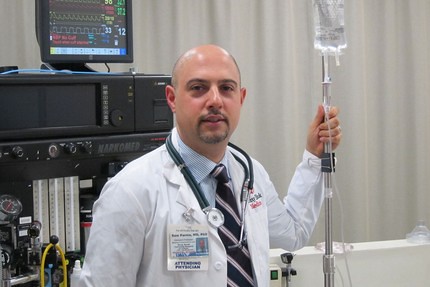 When one thinks of death, it is usually thought of as a sudden event. But today, we have developed a medical science of maintaining someone who may be clinically dead (cardiac arrest and no brain activity) which sometimes results in a complete recovery — even after the patient has been clinically dead for hours. Erasing Death by Sam Parnia chronicles this remarkable advance in medicine, which has allowed death to be held at bay. Sometimes, it even evokes the age old question: do we have a soul?
When one thinks of death, it is usually thought of as a sudden event. But today, we have developed a medical science of maintaining someone who may be clinically dead (cardiac arrest and no brain activity) which sometimes results in a complete recovery — even after the patient has been clinically dead for hours. Erasing Death by Sam Parnia chronicles this remarkable advance in medicine, which has allowed death to be held at bay. Sometimes, it even evokes the age old question: do we have a soul?
The process of saving someone who is clinically dead requires the combined skills of many disciplines. Sam Parnia tells us that from the ambulance medics, to the ER physicians, to the ICU staff, every step necessary to insure recovery must be choreographed perfectly. Unfortunately, there is no national or international set of standards regarding exactly how to treat someone who is clinically dead. It is not mandatory for all ambulances and ER rooms to have body cooling technology or mechanical CPR/Ventilators (two of the most important things needed). It is a matter of luck if a patient quickly makes it to a hospital that happens to have the required equipment and trained staff to correctly guide their recovery. Because of the haphazard, unregulated nature of resuscitation care, hundreds of thousands of people –who could have been saved — die or live with incapacitating brain and organ damage.
“Because of the haphazard, unregulated nature of resuscitation care, hundreds of thousands of people –who could have been saved — die or live with incapacitating brain and organ damage.”
An interesting question arises as death is staved off. Until recently, says Parnia, whenever the brain or heart stopped functioning, the body died. Without at least brain stem function, the heart will not receive the electrical impulses that trigger it to beat. And without a heart beat, a person will die within minutes.
Artificial ventilators allow patients to be kept alive by having these functions replaced by mechanical devices. However, when autopsies were performed on the brains of dead patients kept alive in this manner, nothing but gelatinous much was found in their brains. The question could then be asked, when did the person’s soul, or spirit — the thing that made them the individual that they were, whatever you may call it — leave their still functioning body?
“The question could then be asked, when did the person’s soul, or spirit — the thing that made them the individual that they were, whatever you may call it — leave their still functioning body?”
In Erasing Death, we learn that a whole new field of inquiry was opened on the subject, which was previously never discussed in detail. What combination of electrical and chemical activity produces a person’s persona? Where does it reside? We can see on MRI machines exactly what part of the brain is activated when a sound is heard. We can recognize when something enters our field of vision, or when the brain is in a state of bliss while listening to certain music. So where exactly does our persona, that which makes us love Vivaldi and dislike Bruckner, reside?
This brings us to a classic philosophical debate regarding our consciousness and the essence of who we are. It’s the question that began with Plato and Aristotle 2,500 years ago; Plato said that the soul was something beyond the physical, existing as a timeless essence that transcended physical existence. Where Plato felt that the matter and the form were separate, Aristotle asserted that the two were indistinguishable from each other.  Does the brain contain or create the psyche? It’s a question in debate today by leading neuro scientists. “The problem of consciousness,” as it is called, is in asking how our thoughts, emotions and everything that makes us human are created. Currently, the Aristotelian camp has more supporters than the Platonic (though both groups boast Nobel laureates).
Does the brain contain or create the psyche? It’s a question in debate today by leading neuro scientists. “The problem of consciousness,” as it is called, is in asking how our thoughts, emotions and everything that makes us human are created. Currently, the Aristotelian camp has more supporters than the Platonic (though both groups boast Nobel laureates).
“Does the brain contain or create the psyche? It’s a question in debate today by leading neuro scientists.”
“Consciousness poses the most baffling problems in the science of the mind,” states Parnia, “There is nothing that we know more intimately than conscious experience, [yet] there is nothing that is harder to explain.” He then explains several fascinating schools of thought on the subject — but none of them are able to truly explain the unexplainable.
Then there is the “big question, does consciousness, the self, or the soul become lost…annihilated forever as an entity…immediately after death?” Parnia writes that there is more and more evidence that it doesn’t (which should hearten the Platonists among us). The fact that patients can live through an episode of clinical death and recover with in-tact mental abilties is a possible argument that consciousness interacts with, but exists outside of, the brain itself.
“The fact that patients can live through an episode of clinical death and recover with in-tact mental abilties is a possible argument that consciousness interacts with, but exists outside of, the brain itself.”
Near Death Experiences (or NDEs, which are considered actual death by Parnia) paint a very similar experience. With minor variations, most patients recall being guided toward a tunnel of light often led by some beneficent guide. They move past deceased friends and relatives with a feeling of warmth, love and incredible well being. Patients often recall having an out of body experience wherein they watch from above as doctors desperately try to revive them.
The consistency of these descriptions, even from very young children who have suffered a cardiac arrest and were revived, definitely makes one wonder — do we have a soul And can it survive the death of the body? All in all, Erasing Death by Sam Parnia is a fascinating book on one of the most interesting subjects in modern science and philosophy.
- How do you feel about the questions discussed here? We look forward to your comments below.
Related SevenPonds Articles:
-
Book Review: Proof of Heaven by Eben Alexander, M.D.
- Book Review: “Dying to Be Me” by Anita Moorjani
- Reincarnation or an Afterlife?

 ”Erasing Death” by Sam Parnia
”Erasing Death” by Sam Parnia



 How Dare You Die Now!
How Dare You Die Now!
 Debating Medical Aid in Dying
Debating Medical Aid in Dying
 “Help Me, Helen”
“Help Me, Helen”














